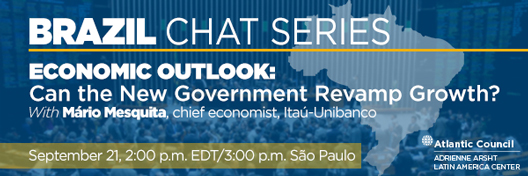 In New York this week, Brazilian President Michel Temer embraced the opportunity to convince investors that Brazil has entered a new era. Brazil’s economy, long in steep decline and with twelve million people unemployed, has started to show signs of rebounding. Inflation is decelerating and analysts have revised GDP growth projections upwards from 0 to up to 2 percent for next year.
In New York this week, Brazilian President Michel Temer embraced the opportunity to convince investors that Brazil has entered a new era. Brazil’s economy, long in steep decline and with twelve million people unemployed, has started to show signs of rebounding. Inflation is decelerating and analysts have revised GDP growth projections upwards from 0 to up to 2 percent for next year.
On September 21, Mário Mesquita, chief economist of Itaú-Unibanco, and Ricardo Sennes, nonresident senior Brazil fellow at the Atlantic Council and partner at Prospectiva Consultancy, joined the Adrienne Arsht Latin America Center for a conference call on the future of Brazil’s economy after the impeachment of President Dilma Rousseff. The debate was moderated by Andrea Murta, deputy director of the Latin America Center.
In an overview of the current economic climate in Brazil, Mr. Mesquita emphasized positive growth indicators corresponding with the political transition.
“It is striking that business confidence indicators across different sectors started to improve quite markedly as impeachment became more likely. We are seeing stabilization and the first signs of a turnaround,” Mr. Mesquita said.
He added that in 2015, Brazil’s inflation rate was close to 11 percent, and this year inflation should drop to a little over 7 percent. For 2017, he predicts it to be at 4.8 percent. “On the whole, we see a better picture looking forward, with positive GDP growth and a lower inflation rate,” affirmed Mr. Mesquita.
Both speakers are confident the Temer administration will succeed in passing the constitutional amendment to introduce a cap on expenditures, described by Mr. Mesquita as the “key element of the government’s fiscal adjustment plan.”
Ricardo Sennes explained that President Temer has succeeded in creating a “broad political coalition,” holding today 70 percent of the vote in the Lower House and 75 percent in the Senate, making his chances of passing the amendment very high.
The political scenario is much better now than it was one month ago. Additionally, Mr. Sennes noted President Temer’s decision to surround himself with “a very strong macroeconomic team,” which “indicates for both the political and business community he has a strategy he is willing to put in place. The results are that public opinion is recognizing these good signs. The level of confidence in the Temer government has been increasing,” said Mr. Sennes.
Despite recent positive indicators, Brazil faces political and fiscal uncertainty. Referencing an expected unemployment rate of 12.5 percent in 2017, Mr. Mesquita noted that social pressure will not disappear overnight.
Similarly, the coming 2018 political elections threaten to undermine Mr. Temer’s current coalition and his chances of maintaining the congressional support needed to pass reforms.
“The timing for Temer is critical. He knows he needs to keep his adjustment agenda moving. The measures he needs to approve are very unpopular, but he also knows if he doesn’t approve these measures he will lose political support,” said Mr. Sennes.
“The key factor to keep his political support is to get the economy moving again.”
While the political and economic future of Brazil remains uncertain, signs of gradual improvement and renewed confidence in the government’s ability to advance necessary reforms are reasons to feel hopeful about economic recovery.
